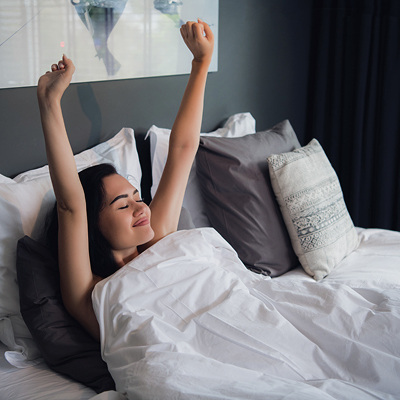Fall Back Tips for Better Sleep
Posted November 02, 2023 by Ketan Deoras, MD

Updated November 2024
Fall is here, and with the change in the season comes the change in our clocks. On the first Sunday in November every year, we set our clocks back one hour. The time change can disrupt your sleep schedule, making it difficult to fall asleep and wake up on time. As sleep is essential for your overall health and well-being, you can do a few things to minimize this impact on your sleep, such as:
- Gradually adjust your sleep schedule.
In the days leading up to the time change, you can start setting your alarm back by 15 to 20 minutes each day to help your body adjust to the new time. - Create a relaxing bedtime routine.
This routine can help you wind down from your day. This might include taking a warm bath, reading a book or listening to calming music. - Exercise regularly.
Exercise can help improve sleep quality, but try to avoid exercising too close to bedtime. Studies have shown that 150 combined minutes of moderate exercise throughout the week has been shown to be helpful for sleep. - Eat a healthy diet.
Eating a healthy diet can help improve overall health and well-being, including sleep. Avoid eating heavy meals or sugary snacks before bed. - If you can, get outside during the day.
Natural light helps regulate your circadian rhythm. When we’re exposed to sunlight during the day, it helps to wake us up and boost our energy levels. This can be more difficult this time of year as daylight is more limited, but the earlier the exposure to sunlight in the day, the better. - Avoid bright light in the evening.
At night, darkness helps promote the production and release of melatonin, a hormone that makes us feel sleepy. Put your phone away for at least an hour before bed, if possible. - Establish a consistent sleep schedule.
Go to bed and wake up at the same time daily, even on weekends. This schedule helps keep your circadian rhythm, which is your body’s natural sleep-wake cycle, on track.
You can also follow these tips year-round to get a good night’s sleep.
If your sleep quality is not improving or worsening, you may have an undiagnosed sleep condition. Summa Health offers comprehensive and fully integrated services to help you regain the healthy sleep you need to improve your overall quality of life. For more information, visit summahealth.org/sleep.
About the Author
Vitality eNews Sign Up
Receive the Summa Health eNewsletter for the latest health tips, advice and updates.


